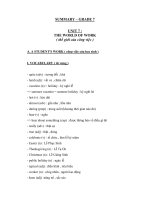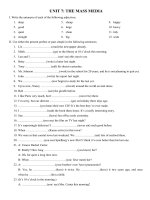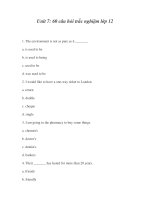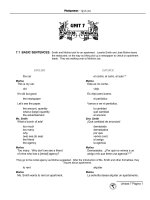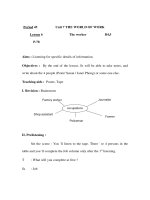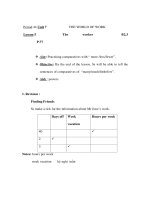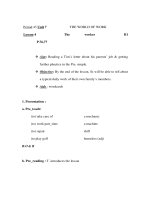UNIT 7: CELEBRATIONS
Bạn đang xem bản rút gọn của tài liệu. Xem và tải ngay bản đầy đủ của tài liệu tại đây (161.06 KB, 8 trang )
English 11 – Advanced
UNIT 7: CELEBRATIONS
Exercise 1. Choose the word whose underlined part is pronounced differently.
1. A. leaf
B. deaf
C. of
D. wife
2. A. creature
B. creative
C. creamy
D. crease
3. A. weigh
B. height
C. eight
D. vein
4. A. food
B. look
C. took
D. good
5. A. naked
B. sacred
C. raised
D. hatred
6. A. flip
B. fridge
C. thrill
D. thrive
7. A. fragment
B. frame
C. fraction
D. frank
8. A. flow
B. frowzy
C. throw
D. blow
9. A. flush
B. flute
C. fruit
D. through
10. A. floppy
B. frosty
C. frontier
D. flock
Exercise 2. Choose the word with the different stress pattern.
1. A. official
B. primary
C. separate
D. optional
2. A. relative
B. envelope
C. interesting
D. entertain
3. A. admire
B. blanket
C. comment
D. gather
4. A. inspiration
B. decoration
C. limitation
D. environment
5. A. service
B. distance
C. money
D. secure
6. A. comment
B. constant
C. firework
D. parade
7. A. agrarian
B. together
C. represent
D. occasion
8. A. decorate
B. calendar
C. envelop
D. festival
9. A. traditional
B. entertainment
C. activity
D. variety
10. A. special
B. prepare
C. throughout
D. believe
Exercise 3. Complete the sentences with the correct form of the word in the brackets.
1. These quantities are ___________for the number of orders received. (sufficient)
2. I am not saying he is ___________, but he is not very good with money. (honest)
3. She has one of the biggest ___________in Britain. (collect)
4. He claimed that his ___________had caused him to become a criminal. (bring up)
5. The government has promised to deal with the problem of _________among young people. (employ)
6. I am sorry about my___________, but I hate being kept waiting. (patient)
7. I’m looking for a ___________gift for an old lady. (suit)
8. The judge told him it was___________to drink and drive, and banned him for a year. (responsible)
9. It was a___________episode in the country’s history. (shame)
10. They celebrate their ___________on 4th July. (depend)
Exercise 4. Read the following passage and choose the word that best complete each gap.
I have always found it difficult to say (1.)___________certain what my memories from my early
childhood are. Are these memories learnt at a later age from overhearing our parents tell of our exploits?
However, there is a particular (2.)___________that I would love to claim as a (3.)___________memory.
When I was just three years old, I went to the post office with my mother where she was going to buy some
stamps. While she was being served, I happened to (4.)___________a small stocking which was hanging
from the counter. It was there to collect (5.)___________for a (6.)___________for the blind. While her back
was (7.)___________I took the stocking and emptied the (8.)___________into my coat pocket. Of course I
was too young to know any better. When it was realized what I had done, everybody roared with laughter
except, that is, for my mother who was a little embarrassed. She quickly emptied the money back into the
stocking (9.)___________, incidentally, a few pennies of my own. One of the clerks was something of an
amateur cartoonist and he did a drawing of me robbing an old lady. This cartoon was (10.)___________in
the post office for the next couple of years.
1. A. with
B. for
C. by
D. in
2. A. activity
B. accident
C. item
D. incident
3. A. realistic
B. right
C. genuine
D. distinct
4. A. perceive
B. notice
C. locate
D. point
5. A. contributions
B. offerings
C. givings
D. sacrifices
6. A. charity
B. pity
C. sympathy
D. care
7. A. twisted
B. shown
C. turned
D. covered
8. A. inside
B. internals
C. containers
D. contents
9. A. not knowing
B. unexpecting
C. unsuspecting
D. including
10. A. paraded
B. performed
C. projected
D. displayed
Exercise 5. Rewrite the following using the possessive case.
1. the house of Mr. Smith
→
High School for Gifted Students - HNUE
1
English 11 – Advanced
2. a doll of the girls
→
3. the bags of those women
→
4. the orders of our boss
→
5. the books of the children
→
6. the influence of the sun
→
7. the atmosphere of the earth
→
8. the joys and grieves of life
→
9. the arrival of the ship
→
10. the policy of the company
→
11. the gravitation of the planet
→
12. a cruise which lasts three weeks
→
13. work which takes two hours
→
14. a distance of five kilometers
→
15. the operation which lasted four hours
→
16. the flight which took three hours
→
17. a semester of eight weeks
→
18. the rest which lasted an hour
→
19. a play of three acts
→
20. a football match which last ninety minutes
→
Exercise 6. Choose the correct sentence which has the same meaning as the given one.
1. I don’t find it difficult to get up early in the morning.
A. I used to get up early in the morning.
B. I hate getting up early in the morning.
C. I’m used to getting up early in the morning.
D. It’s difficult for me to get up early in the morning.
2. “When did you leave school?” the interviewer asked me.
A. The interviewer told me to leave school.
B. The interviewer asked me when I had left school.
C. The interviewer said that he had left school. D. The interviewer asked why I had left school.
3. It’s more dangerous to ride a motorbike than to drive a car.
A. Riding a motorbike is more dangerous than driving a car.
B. Driving a car is more dangerous than riding a motorbike.
C. Riding a motorbike is as dangerous as driving a car.
D. Driving a car is the most dangerous.
4. I wasn’t invited to the party last Sunday.
A. I wish I were invited to the party last Sunday. B. I wish I had been invited to the party last Sunday.
C. I wish I could go to the party last Sunday.
D. I wish they invited me to the party last Sunday.
5. They were serving lunch when we arrived.
A. Lunch is being served when we arrived.
B. Lunch would be served when we arrived.
C. Lunch was being served when we arrived.
D. Lunch was served when we arrived.
6. I haven’t stayed in the hotel for years.
A. It’s years since I stayed in a hotel.
B. It’s years since I stay in a hotel.
C. I haven’t stayed in a hotel years ago.
D. It’s year when I stayed in a hotel.
7. “How long have you been waiting here?” the girl asked me.
A. The girl asked me how long I had been waiting here.
B. The girl asked me how long had I been waiting here.
C. The girl asked me how long I had been waiting there.
D. The girl asked me how long had I bee waiting there.
8. He doesn’t buy this new car because he doesn’t have enough money.
A. If he had enough money, he can buy this new car.
B. If he has enough money, he could buy this new car.
C. If he had enough money, he could buy this new car.
D. If he had had enough money, he could buy this new car.
9. They are building a new bridge here.
A. A new bridge is building here.
B. A new bride is built here.
C. A new bridge here is built.
D. A new bridge is being built here.
10. She didn’t know you were ill, so she didn’t visit you.
A. If she had knew you were ill, she would have visit you.
B. If she knew you were ill, she would visit you.
C. If she had known you were ill, she would have visited you.
D. If she knew you are ill, she would visit you.
Exercise 7. Choose the underlined part that needs correcting in each sentence.
High School for Gifted Students - HNUE
2
English 11 – Advanced
1. Many(A) experts group the language(B) of the world into(C) nine major language families(D).
2. Europe has(A) many of the(B) world’s oldest and more(C) respected universities(D).
3. During late(A) 1900’s, many companies(B) invested heavily(C) in digital communications(D) systems.
4. The most common(A) languages after English in(B) Australia are(C) Chinese, Italian, Greek,
Vietnam(D), and Arabic.
5. Each of(A) groups of invaders(B) added its own(C) traditions and speech to(D) English civilization.
6. Yesterday evening while(A) I was watching(B) T.V, Mary pays(C) me a visit(D).
7. Most(A) women used to(B) stay(C) at home and done(D) homework.
8. A laser vaporizes(A) the bones without touch(B) any of(C) the surrounding tissue(D).
9. It is so(A) an exciting(B) novel that(C) I do not want to stop reading(D) it.
10. The doctor advised(A) doing(B) exercise, drinking(C) milk and not to smoke(D).
Exercise 8. Use the correct form of the words in brackets to complete the following sentences.
1. He is an informed (comment)
on political events.
2. They’re listening to a broadcast (comment)
of a football match.
3. We appreciate your (constant)
.
4. He’s (constant)
bothering us.
5. We have heard of the (grand)
of the Swiss Alps.
6. You should consider all the factors that are (influence)
in making a decision.
7. The Browns are a family noted for its (long)
.
8. He arrived, as if in answer to her (pray)
.
9. We should elect the one who will be an effective (represent)
of voters’ interests.
10. This is a (represent)
collection of British insects.
Exercise 9. Fill one suitable preposition in each blank to complete the following sentences.
1. Have you got any comments
the new agrarian laws?
2. The bride was dressed
white.
3. Don’t bother to dress
- come as you are.
4. Those so-called friends of hers are a bad influence
her.
5. The priest is praying
the dying man.
6. She prayed
God
forgiveness.
7. The managements should get together
the union.
8. Wimbledon is a shine
all lovers of tennis.
9. The influence
parents
their children is great.
10. Why didn’t you represent the matter
the way I had told you?
Exercise 10. Choose one word or phrase to fill in each blank to complete the following sentences.
kumquat tree
shrine
paraded
fireworks
get-togethers
lucky money
agrarian
pine trees
grand
plum pudding
1. Thanks to
reforms, farmers had their own land.
2. American people usually try to make others feel comfortable when they are invited to informal
.
3. A
procession is usually held on our National Day.
4. The
is also a symbol of prosperity.
5. They enjoy eating
at Christmas.
6. Children usually put their
into a piggy bank.
7. The strikers
through the city centre.
8. Da Lat City is famous for its forests of
and old castles.
9. He built a chapel as a
to the memory of his dead wife.
10. All children enjoy watching
.
Exercise 11. Fill each numbered blank with one suitable word to complete the following passage.
Halloween is the last night of October and it used to be thought the most enchanted night of the year.
It was the night when (1.)
and evil spirits came back on earth to weave their magic spells.
Superstitious people kept up many strange old (2.)
in an effort to keep these evil influences
away. Farmers used to light big fires in their fields, and the farm workers and their families would walk
around the fields (3.)
old songs and hymns. At intervals, the strange procession would stop to
hear the local priest offer (4.)
to the good spirits, and ask them to help keep the evil ones
away.
Great care was taken that (5.)
of the farm animals were left in the fields. They would
all be locked up (6.)
in their stables and sheds and over each of the stable and shed doors a
few rowan leaves would be (7.)
. Witches and evil spirit would not go anywhere near the
rowan tree. In more recent times, Halloween has become a time for parties, when children (8.)
up as witches and play all kinds of special games such as ducking for the apple. After the games
High School for Gifted Students - HNUE
3
English 11 – Advanced
there is often a big supper with plenty of pumpkin pie cakes and a lot of (9.)
delicious
things to eat.
But for the most part the children enjoy the time of dressing up and playing their (10.)
game of “Trick or Treat”. They run down each street (11.)
on the doors crying loudly
“Trick or Treat”. And most people have some (12.)
ready to give them. Those that do not can
expect maybe to (13.)
a tyre flattened, or their windows covered in soap. Or the children may
just knock on the door and run away.
Many of the houses have a jack-o’-lantern in their windows, which are hollowed out pumpkins with
candles (14.)
inside them. But in this modern age many of the pumpkins are being (15.)
with plastic electric ones that can be brought out each year.
Exercise 12. Circle A, B, C or D to identify the underlined part in each line of the following passage
that needs correcting.
1. In Scotland the last(A) day of the(B) year – or “Hogmanay” like(C) the Scots call it(D) - is
2. the most important(A) holiday of winter(B) – even(C), more important than Christmas(D).
3. On(A) New Year’s Eve friends and neighbors go about(B) from(C) houses to houses(D)
4. drinking a toast(A) to the(B) New Year in good(C) Scotch whisky and wishing for(D) each
5. other luck(A). On New Year’s Day all of(B) the shops and factories are closed(C) and(D)
6. families meet(A) one another(B) for a big meal(C) and a family party(D). Scottish
7. people who live(A) away from their home(B) country are even more(C) careful keeping(D)
8. Hogmanay than those(A) at home. The(B) Scotch(C) in London, for example, meet on(D) New
9. Year’s Eve in(A) Piccadilly Circus in the(B) West End or(C) outsides(D) Saint Paul’s Cathedral
10. in the city who(A) dance in(B) the street, sing(C) songs and of course(D), drink whisky.
Exercise 13. Fill in each blank with “a, an, the, ∅”
VALENTINE’S DAY AROUND THE WORLD
ITALY
There is a custom in Italy for (1.)
young couples to get engaged on Valentine’s Day. Some
shops sell (2.)
baskets and (3.)
cups which are filled with sweets and tied with ribbons.
(4.)
young lovers offer these to each other as a sign of their love.
KOREA
On February 14th many young women give sweets to their boyfriends, and March 14 th their
boyfriends buy them some chocolates. However, (5.)
young people who don’t have (6.)
girlfriend or (7.)
boyfriend can celebrate their own day on April 14 th. On this special
day, called “Black Day”, these young people sit with their friends, who are in (8.)
same situation, and
eat “jajang” noodles, which are black. This ensures that everyone has (9.)
day to celebrate.
THE UNITED STATES OF AMERICA
Most people in the United States take Valentine’s Day as (10.)
opportunity to express
their feelings towards their loved one or to offer (11.)
hand of friendship to (12.)
others. However, it is popular these days to send (13.)
“anti-Valentine” card. These
cards either have (14.)
insulting message (to the person you hate) or say goodbye (to your current
partner). If you receive a card with (15.)
message C-Ya! (See you!), it means your boyfriend or
girlfriend wants to end your relationship.
Exercise 14. Circle A, B, C or D to choose the best answer for each space in the following passage
Christmas is the biggest festival of the year in most of Britain. Celebrations start properly on 24 th
December, Christmas Eve, although there have been several weeks of preparation (1.)
The
Christmas tree and all the presents, food, drinks, and decorations have been (2.)
Christmas
cards
have already been sent to friends and (3.)
About a week before Christmas, people usually put (4.)
their decorations and decorate the Christmas tree with lights, various coloured decorations
and a(n) (5.)
on the top. Family presents are usually put under the tree.
Christmas is a family (6.)
and many of the customs centre on children. When they go to
bed on Christmas Eve, children hang up a pillow case or a sack for their presents. (Traditionally, it (7.)
be a stocking, but a stocking wouldn’t hold enough to satisfy today’s kids). While the children are
asleep, so the custom goes. Father Christmas or Santa Claus comes (but only to children who have been
good). He travels from the North Pole in a sleigh which is pulled by reindeer. After (8.)
in the roof,
Father Christmas climbs down the chimney and puts presents in the sacks that the children have left out.
Christmas Day is the biggest day of the holiday. On Christmas morning (often very early!), children
open the presents that were in their sacks. Some families go to church. The traditional Christmas dinner (9.)
roast turkey with potatoes and various other vegetables. This is followed by Christmas
pudding – a dark, rich mixture of flour, fruit, sugar, nuts, and brandy. Before the dinner people usually pull
crackers – small rolls of paper that have gifts, jokes, and party hats inside. (10.)
to
say,
large
quantities of beer, wine, and spirits are also drunk.
High School for Gifted Students - HNUE
4
English 11 – Advanced
How the rest of the day is spent (11.)
a lot from family to family and may include opening the
rest of the presents that are under the tree, playing games, going for a walk or (12.)
going
to
sleep in an armchair! And there is always a special (13.
of films and other programmes on
television.
December 26, which is called Boxing Day, is also a holiday. On Boxing Day most people go out to
see friends, watch sports events, go to the theatre to see a pantomime, or increasingly (14.)
shopping. Most of the large stores start their winter sales on Boxing Day now. But the Christmas holiday is
still not over. In fact, many offices and factories close for the whole Christmas period from 24 th December to
2nd January. On New Year’s Eve there are a lot of parties and at midnight everyone joins hands to sing Auld
Lang Syne. Then after New Year’s Day to sleep it off, that’s Christmas (15.)
for another year.
1. A. before
B. beforehand
C. forward
D. forwards
2. A. made
B. done
C. given
D. bought
3. A. relations
B. associates
C. relative
D. acquaintances
4. A. on
B. out
C. up
D. upon
5. A. saint
B. god
C. fairy
D. angel
6. A. celebration
B. reunion
C. get-together
D. meeting
7. A. can
B. must
C. might
D. should
8. A. coming
B. going
C. landing
D. climbing
9. A. contains
B. consists of
C. includes
D. involves
10. A. Needless
B. Necessarily
C. Unnecessary
D. Unnecessarily
11.A. changes
B. differs
C. differentiates
D. varies
12. A. only
B. sheer
C. merely
D. just
13. A. plan
B. schedule
C. timetable
D. course
14. A. now
B. presently
C. currently
D. nowadays
15. A. up
B. over
C. off
D. on
Exercise 15. Use the correct form of the verbs in brackets
Trick or Treat for UNICEF
Since 1950 children around the world (1. help)
other children by trick-or-treating for
UNICEF. Instead of (2.collect)
all that sugary candy, kids can trick-or-treat with special made
UNICEF boxes and donate the funds (3. help)
proper nutrition, clean water, education,
and emergency relief.
Kids (4. raise)
$110 million over the years and this amount (5. continue)
to rise as more and more kids participate. As parents (6. become)
more
health-conscious
and warier of candy from strangers, UNICEF (7. offer)
this program as an excellent opportunity
(8. enjoy)
the trick-or-treating fun and help a good cause.
Exercise 16. Some of the sentences below are not correct. Tick (√) the right ones, and correct the
wrong ones.
1. Someone who saw the accident should contact the police.
2. I wasn’t feeling hungry, so I didn’t want to eat anything.
3. My umbrella is black and the blue once is my sister’s.
4. There was a thunderstorm during the night but I heard something.
5. Martin was in hospital for three days but everyone went to see him.
6. If anyone has any question, I’ll be pleased to answer him.
7. Mai’s parents let her choose some sweets, and she took the small ones.
8. Are you thirsty, Michael? Would you like anything to drink?
9. I have looked all over the house but I can’t find my watch somewhere.
10. Hardly someone passed the exam because it was extremely difficult.
Exercise 17. Complete each blank with one of the following words or phrases. Use each item once only.
attracts
erected
commemorate
held
sponsored
street entertainment
floats
stalls
puppet shows
lasts
dress up
opening ceremony
local event
traditional crafts
colorful procession
Every year a festival is (1.)
to (2.)
the founding of our town over
150 years ago. The festival (3.)
for a week and during that time many local people (4.)
in old-fashioned clothes, sometimes even wearing them at work.
On the first day of the celebrations, an (5.)
is performed by a visiting celebrity at the
band-stand in the town centre. From there a (6.)
makes its way through the streets of the
town. We spend weeks beforehand preparing the (7.)
, many of which are (8.)
by local firms, and organizations. In addition to these floats, there are bands and (8.)
, such as fire-eaters, juggles and clowns walking stilts.
High School for Gifted Students - HNUE
5
English 11 – Advanced
The procession ends up in the park, where a large marquee has been (10.)
. Around
the marquee there are various (11.)
where you can buy local products or play traditional
games.
Throughout the week many events are organized to recreate life 150 years ago. You can have your
photograph taken wearing 19th century clothes or lean (12.)
such as basket-weaving. For the
children there are (13.)
and talent contests.
The festival (14.)
thousands of visitors, and what used to be just a small (15.)
has now grown into a major tourist attraction.
Exercise 18. Fill in each numbered blank with a suitable word.
THE TRINIDAD FESTIVAL
Festivals in the Caribbean can be huge, colorful events that stretch the imagination. One of the
biggest of these, the Trinidad Carnival, consists of five days of non-stop parties and music competitions that
end (1.)
a costumed parade through the streets of the capital, Port of Spain.
The music at the carnival is calypso. Calypso is (2.)
than just music for singing and dancing.
An evening in ‘calypso tent” will give you a course in Trinidadian politics and (3.)
you know
all about the island gossip. But (4.)
the topic of the songs, calypso’s main function is (5.)
entertain.
One of the most important parts of the carnival is the calypso competition. This is divided (6.)
two sections. First of all, on the Sunday, the best song is judged. Ten finalists each sings two songs in
front of (7.)
crowd of 30.000. The singers all do (8.)
best to give performances that
will have the crowd shouting and screaming (9.)
more, and the winner receives the highly-prized
title of Calypso Monarch.
Then, on the Monday, there is the Roadmarch of competition, (10.)
the best dance tune is
decided. Dancers in fantastic costumes spill out onto the streets (11.)
their thousands at 4 p.m
and dance in a parade with the calypso bands. This goes on (12.)
the carnival ends the following
night. The winner is the person (13.)
tune is being played most often as the ands pass the place where
the judges (14.)
situated.
And the music has to be good, to keep as (15.)
as half of million people dancing nonstop for five days.
Exercise 19. Read the passage and choose the correct answer for each question.
Independence Day in the United States is observed annually on the Fourth of July. For most
communities throughout the nation, the traditional celebration includes parades down the main streets,
picnics with hot dogs and lemonade, and, of course, a fireworks display at night. In some towns across the
country, however, special events are planned in honor of the occasion. In Bristol, Rhode Island, fire engine
teams from communities throughout New England compete in a contest to squirt water from their fire hoses.
Flagstaff, Arizona hosts a huge three-day powwow, including a rodeo, for twenty Native American tribes.
The annual Eskimo games with traditional kayak races are held in Kotzebue, Alaska. Two auto races are
always scheduled for the Fourth, including a four-hundred-mile stock car event at the Daytona International
Speedway in Daytona, Florida, and an annual auto race up the fourteen-thousand- foot precipice at Pike’s
Peak in Colorado.
Several small towns celebrate in other unique ways, Hannibal, Missouri, the hometown of Mark
Twain, invites the children to participate in a fence-painting contest, reenacting a scene from Twain’s novel
Tom Sawyer, Lititz Pennsylvania congregates in the Lititz Springs Park to light thousands of candles and
arrange them in various shapes and images.
In Ontario, California, the townspeople combine the traditional with the unusual by setting up tables
along Euclid Avenue for what they describe as “the biggest picnic table in the world.” In this way, everyone
in town has a front-row seat for the two-mile parade.
1. With which of the following topics is the passage primarily concerned?
A. Traditional celebrations for the Fourth of July.
B. Holidays in the United States.
C. The origin of Independence Day.
D. Small towns in America.
2. How is Independence Day observed in Ontario, California?
A. By hosting a powwow and rodeo.
B. By sponsoring a stock car event.
C. By squirting water from fire hoses.
D. By setting up tables along the parade route.
3. The author mentions all of the following as ways the Fourth of July is celebrated EXCEPT
A. parades
B. races
C. dances
D. fireworks
4. The word “huge” in the first paragraph could best be replaced by which of the following.
A. exciting
B. amusing
C. complicated
D. large
5. It can be inferred from the passage that
.
A. the Fourth of July is celebrated in Canada as well as in the United States
B. towns in the United States celebrated July Fourth in different ways because of their regional customs.
C. although fireworks are not legal, they are displayed on July Fourth.
High School for Gifted Students - HNUE
6
English 11 – Advanced
D. the Fourth of July is not celebrated in large cities in the United States.
Exercise 20. Rewrite the following sentences so that the meaning remains the same.
1. Have you made any arrangement for this weekend? (anything)
→Are
this weekend?
2. The police want to contact people if they saw the robber. (anyone)
→The police want to talk to
the robber.
3. How should people be punished if they start a fire? (someone)
→What should we do with
a fire?
4. If people deliberately start a fire, they should be punished. (anyone)
→I think
a fire should be punished.
5. Bob couldn’t hear what the teacher was saying. (something)
→ The teacher
couldn’t hear it.
6. All the people were surprised to see Tom leave the party early. (everyone’s)
→To
the party early.
7. Jane was sure there was no mistake in her homework. (nothing)
→Jane was sure
with her homework.
8. Nobody plays this piece as beautifully as he does. (more)
→He plays this piece
9. I was the only person who wanted to watch the programme. (else)
→ There was
me who wanted to watch the programme.
10. While I was driving, I realized that the car wasn’t working properly. (something)
→ While I was driving, I realized that
the car.
Exercise 21. Choose the best answer to complete each of the following sentences
1. If I can’t do my homework this afternoon,…………….
A. I have asked someone to help me
B. I would ask someone to help me
C. I will ask someone to help me
D. I would have asked someone to help me
2. If you traveled by plane,…………
A. you would get there much faster
B. you will get there much faster
C. you would have got there much faster
D. you will be getting there much faster
3. …..had I managed to repair my car earlier.
A. I could drive you to the airport
B. I could have driven you to the airport
C. I can drive you to the airport
D. I can be driving you to the airport
4. ………., you’d know what we’re talking about now.
A. If you aren’t late
B. If you weren’t late
C. If you wouldn’t be late
D. If you hadn’t been late
5. I usually have a big birthday party unless…………..
A. I was short of money
B. I would be short of money
C. I will be short of money
D. I am short of money
6. If you’d told me you were coming,……….
A. I can get some food in
B. I’d have found us something to eat
C. I made a lovely dish
D. I would cook a delicious meal for you
7. If you’re too ill to come, ………..
A. I’ll come over and see you
B. I wouldn’t have done all this for you
C. I asked someone else
D. I myself would do it
8. ……., the phone will be cut off.
A. Should you not pay the phone bill today
B. If you didn’t spend your money on the phone bill immediately
C. Unless you had paid the phone bill
D. Would you have get the phone bill paid by someone
9. If I’d known you weren’t coming,…………..
A. I wouldn’t be very upset
B. I would like to know why
C. I wouldn’t have gone to so much trouble
D. I wont be worried so much
10. ………, I would have given up years ago.
A. If you didn’t help me
B But your assistance for me
C. Were you not to give me your assistance
D. Had it not been for your help
11. If you’re not coming,……….
A. perhaps you’d have the courtesy to tell me
B. we’d never have met
C. you’d be so lucky
D you would have told me earlier
12. If only you’d come,…………..
High School for Gifted Students - HNUE
7
English 11 – Advanced
A. I’ll be the happiest boy alive
B. I’d have had a lovely time
C. I would look forward to it
D. I shall remember that day forever
13. If you do decide to come,…………..
A. the party’s always a success
B. I won’t be coming either
C. let me know
D. I would have picked you up
14. ………, I would write to him every week.
A. If someone tells me his address
B. Did he live far away from me
C. Unless he phones me
D. Were I to know his address
15. If you really don’t want to come,…………..
A. I can’t be sure B. I’ll understand
C. tell me tomorrow D. you would feel sorry for it.
Exercise 22. Choose one sentence that has the same meaning as the root one
1. I think you should revise for the exam.
A. If I were you, I would revise for the exam. B. If I am you, I will revise for the exam.
C. If I would be you, I revised for the exam.
D. If I will be you, I revise for the exam.
2. You can’t make a cake without flour.
A. Unless you don’t use flour you can’t make a cake.
B. Unless you use flour you can’t make a cake.
C. You can make a cake unless you use flour
D. You can make a cake unless you will use flour.
3. The house didn’t burn down because the fire brigade came immediately.
A. The house would burn down if the fire brigade didn’t come immediately.
B. The house will burn down if the fire brigade doesn’t come immediately.
C. The house had burnt down would the fire brigade not have come immediately.
D. The house would have burnt down had the fire brigade not come immediately.
4. If I had been watching the road, I wouldn’t have had an accident.
A. I have an accident because I am not watching the road.
B. I was watching the road, so I didn’t have an accident.
C. I am watching the road, so I don’t have an accident.
D. I had an accident because I wasn’t watching the road.
5. If I spoke English better, I could work in Australia.
A. I speak English very good to work in Australia.
B. I don’t speak English well enough to work in Australia.
C. I can work in Australia because I speak English very well.
D. I didn’t work in Australia because I couldn’t speak good English.
Exercise 23. Error correction
1. Ice always melts(A) if the air(B) temperature will be(C) warm enough(D).
2. Were we to run(A) our own(B) business, we would have been(C) more independent(D).
3. I would have saved(A) some food for you(B) if I knew(C) you were going to be late(D).
4. Should Tom help(A) us, the(B) job would(C) only take half an hour(D).
5. If you slept(A) better(B) last night, you wouldn’t be(C) so tired(D) now.
6. The latest addition to(A) our company, Ms. Nakamura, attended one of the wellest-known (B)
universities, had some of the most famous business instructors(C), and scored among(D) the highest
in her graduating class.
7. The office furniture(A) that was ordered last month have just arrived(B), but Mr. Ames and I
aren’t(C) sure exactly how the boss wants us to arrange(D) it.
8. I enjoy to get together(A) with colleagues and listening to(B) them tell jokes, but I don’t like talking
about work(C) or complaining about(D) things.
9. The mathematician and astronomer(A) David Ritten House was(B) one of the first man(C) of
science(D) in the American colonies.
10. There are(A) probably around(B) 3000 languages speaking(C) in the world(D).
High School for Gifted Students - HNUE
8

